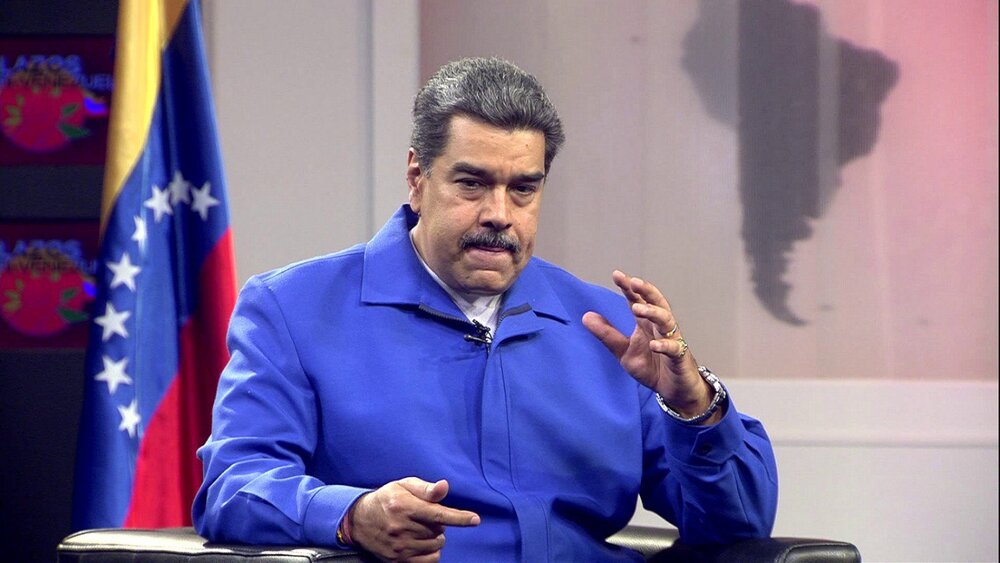Venezuela, Iran share objective to confront imperialism: Maduro

TEHRAN- Venezuelan President Nicolas Maduro has asserted that Venezuela and Iran share a common goal of combating colonialism and imperialism across the world.
Maduro made the statements in an exclusive interview with Iran's Spanish-language television channel Hispan TV after arriving in Tehran on Friday at the head of a high-ranking politico-economic delegation.
Venezuela and Iran, according to Maduro, are in the forefront of shaping a world free of imperialism and hegemonic powers.
The Venezuelan president underlined that the age of U.S. military domination in the globe has come to an end.
Maduro stressed that mankind is transitioning and a new geopolitical structure would be built in the globe, and that Venezuela and Iran should share expertise in all disciplines to create a new world.
Venezuela and Iran, two nations united by similar views on international challenges and coercive measures by the U.S. and its allies, have maintained diplomatic relations for almost 60 years. However, when late commander Hugo Chavez came to power in Venezuela in 1999, bilateral connections grew considerably.
“We are living through a time of geopolitical transition that will define the destiny of the 21st century,” the Venezuelan president stated, referring to the situation in Ukraine.
Maduro went on to say that the sound of the fall of hegemons has been reverberating for a century, calling Iran and Venezuela champions of defying hegemons.
He also noted that the complete plan of collaboration is the driving force behind the creation of a new world.
The Venezuelan president also praised Iran for taking the bold step of sending gasoline and petroleum tankers to his country, stating that Tehran's gasoline supply to Caracas was a huge aid to the Venezuelan people.
Despite U.S. sanctions and threats, Iran provided gasoline to Venezuela, according to Maduro.
Iran and Venezuela have resisted U.S. economic pressure and worked closely together to mitigate the effects of unlawful sanctions, particularly those targeting their oil industries.
In the face of U.S. pressure on Venezuela's transportation and commerce services, Iran has supplied gasoline cargoes and equipment required in oil refineries. Venezuela has also received significant quantities of condensate, a heavy oil diluent, from Iran.
In January, oil industry analysts said that Venezuela had increased its oil production owing to Iranian assistance, despite U.S. sanctions on Caracas.
President Maduro also said that Venezuela and Iran have had fraternal connections for decades, underlining his country's commitment to deeper collaboration with Tehran.
Caracas and Tehran, he noted, both have revolutionary histories and have always backed each other in difficult times.
Maduro also noted that the two nations are collaborating on expanding tourism relations and establishing direct flights between Caracas and Tehran.
He stated that Venezuela welcomes and encourages Iranian investment, and that a group accompanying him is working to enhance ties.
Maduro declared that Venezuela and Iran will usher in a new era in bilateral relations.
The Venezuelan president also emphasized the importance of fully informing Iranians and Venezuelans about the sanctions and finding methods to oppose such a “ruthless war”.
Caracas and Tehran, according to Maduro, have created economic resistance plans and are trying to expand them.
He stated that one of the two countries' primary methods to overcome sanctions is to include people in their efforts.
The president of Venezuela hailed Palestine as humanity's most important cause. Maduro praised Palestine's heritage for allowing members of all religions to coexist together.
President Maduro chastised the international community for keeping mute in the face of the Israeli regime’s atrocities against Palestinians, adding that Venezuela and Iran will continue to back Palestinian resistance against Israeli oppression.
